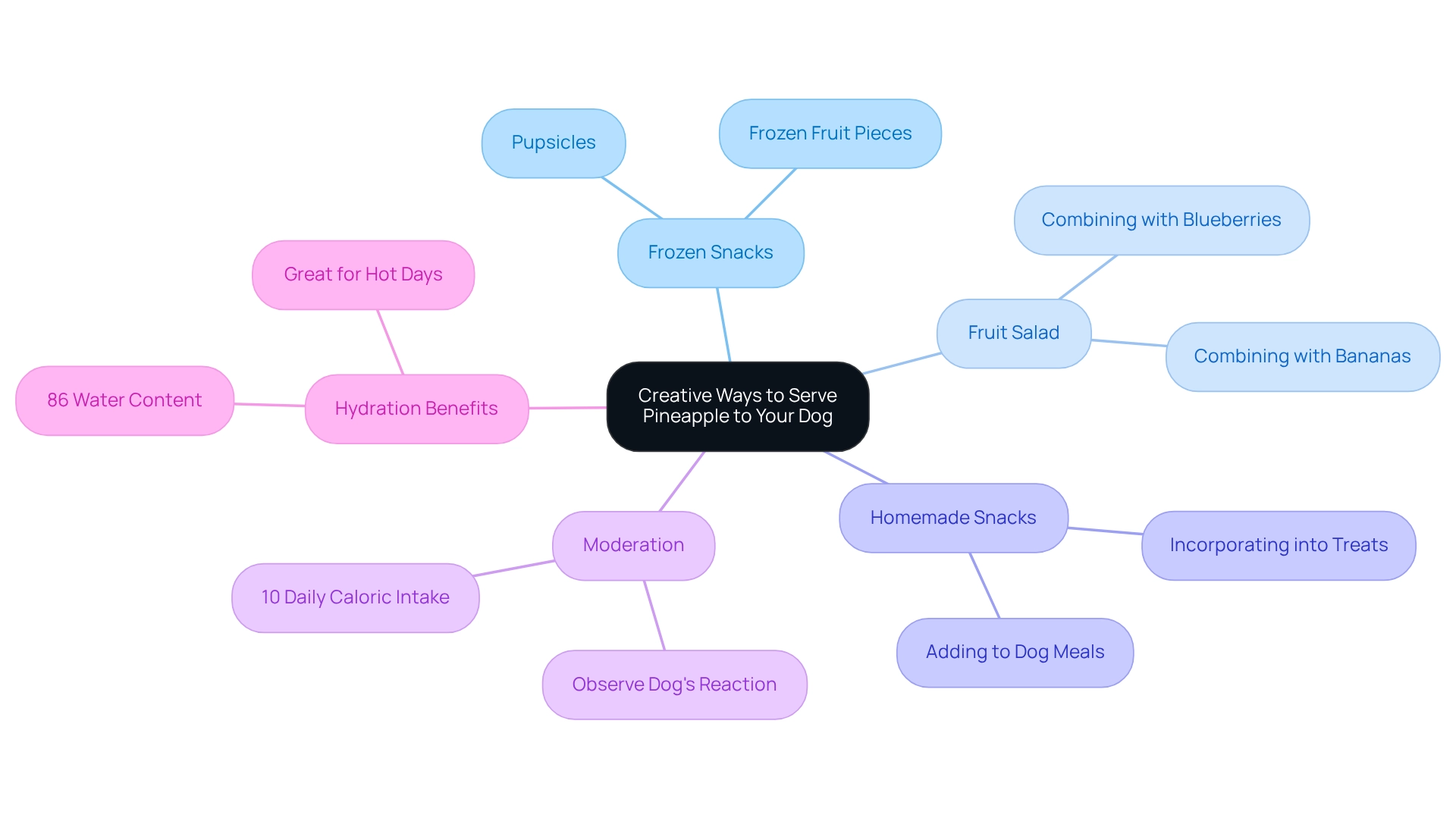

Pineapple for Dogs: Safe Feeding, Benefits, and Creative Serving Ideas
by Lena Park
Last updated: July 11, 2025
Verified and Approved by:
Angela Morris,
MSW, LCSW
Fact Checked

Overview
Pineapple can be a safe and nutritious treat for dogs when offered in moderation. It provides valuable nutrients such as vitamin C, antioxidants, and dietary fiber, all of which can support your dog’s immune health and digestion. However, it’s essential to introduce pineapple carefully to prevent any digestive discomfort.
As a loving pet owner, always remember to consult your veterinarian to ensure that this treat aligns with your dog’s unique dietary needs. Your furry friend deserves the best, and with thoughtful choices, you can contribute to their happiness and well-being.
Introduction
In the pursuit of healthier treats for our beloved furry companions, pineapple stands out as a tropical delight brimming with nutritional benefits. This low-calorie fruit not only delights taste buds but also provides a wealth of vitamins, antioxidants, and dietary fiber that can enhance a dog’s overall health.
However, as pet owners, it’s crucial to recognize the importance of safe feeding practices, potential risks, and creative ways to serve this fruit. By approaching this fruity treat with care and moderation, we can ensure that our dogs savor the sweetness of pineapple while enjoying its health benefits.
Understand the Nutritional Benefits of Pineapple for Dogs
When given in moderation, pineapple for dogs is a tropical fruit that offers a range of nutritional benefits. This low-calorie treat serves as a healthier alternative to high-fat or sugary snacks, and it is rich in vitamin C, which plays a vital role in supporting the immune system and enhancing overall health. Additionally, this delightful fruit is packed with antioxidants that help combat oxidative stress, contributing positively to a dog’s well-being. It is also a wonderful source of dietary fiber, promoting healthy digestion and regular bowel movements.
One of the remarkable components of pineapple is bromelain, an enzyme known for its ability to assist in protein digestion and potentially reduce inflammation. Furthermore, this tropical fruit contains essential nutrients such as potassium, magnesium, and manganese, all of which are crucial for maintaining a dog’s health. However, it’s important to remember that while pineapple for dogs is nutritious, it should be offered as an occasional indulgence rather than a staple in a dog’s diet. Consulting a veterinarian is always a good idea to ensure that any dietary changes align with a dog’s specific health needs.
As highlighted by Origin Labs, pet owners should also be mindful of the potential effects on blood sugar levels in diabetic canines and the acidic nature of the fruit’s juice, which can lead to tooth enamel erosion in pets. By practicing moderation and following proper dietary guidelines, where fruits should only constitute a small portion of a dog’s overall diet, pet owners can enrich their dog’s diet with healthy treats while ensuring nutritional balance. This thoughtful approach not only supports a dog’s health but also strengthens the bond between pet and owner.

Implement Safe Feeding Practices for Pineapple
When providing pineapple for dogs, it’s vital to embrace safe feeding practices. Always opt for fresh, raw fruit instead of canned varieties, which often contain added sugars and preservatives that can be harmful. Before serving, kindly remove the tough outer skin and the core, as these parts may pose choking hazards and could lead to gastrointestinal blockages. Slice the fruit into tiny, bite-sized portions to make chewing and digestion easier for your furry friend.
Start with a limited quantity to observe your dog’s response, especially if it’s their first time trying the fruit. A few small pieces are usually sufficient for most dogs, and it’s wise to limit this fruit to no more than 10% of their daily caloric intake. Remember, excessive consumption can lead to digestive issues such as diarrhea or an upset stomach.
As The Adored Beast Team suggests, consider pineapple for dogs an occasional treat rather than a regular part of your dog’s diet. By following these gentle practices, you can enhance your dog’s happiness and well-being while minimizing potential risks.

Recognize Risks and Monitor Health After Feeding Pineapple
While pineapple for dogs can be a nutritious snack for our beloved canines, it is essential to recognize the potential dangers that come with it. Overconsumption may lead to gastrointestinal upset, such as diarrhea and vomiting, primarily due to its high sugar and fiber content. Additionally, some dogs may have allergies or sensitivities to this fruit, which can manifest as itching, swelling, or digestive issues. It’s estimated that around 10% of dogs may experience food allergies, with fruits like mango being among the possible triggers.
It’s important to understand that canned fruit is not advisable for dogs, as it often contains added sugars and syrup that can lead to stomach discomfort. When introducing fruit into your dog’s diet, please observe their health closely for any signs of unease or adverse reactions. Symptoms such as vomiting, diarrhea, or lethargy should prompt you to stop feeding the fruit immediately and consult your veterinarian. Research indicates that gastrointestinal issues can arise from sudden dietary changes, highlighting the importance of a gradual introduction and careful observation. By staying attentive, pet owners can ensure their furry companions enjoy fruit safely and healthily.

Explore Creative Ways to Serve Pineapple to Your Dog
There are many creative ways to serve pineapple for dogs, transforming this tropical fruit into a delightful and nutritious treat. One popular method is to freeze small pieces of fruit, creating a refreshing snack that is especially enjoyable during hot weather. For a fun twist, consider blending tropical fruit with plain yogurt and freezing the mixture in molds to make ‘pupsicles.’
Combining tropical fruit with other dog-friendly options, such as blueberries or bananas, can lead to a vibrant and healthy fruit salad that your dog will adore. Additionally, think about adding a little bit of fruit into homemade dog snacks or meals to enhance both taste and nutrition.
When introducing fruit into your dog’s diet, moderation is essential; it should account for no more than 10% of their daily caloric intake. Always keep portions limited and observe your dog’s reaction to new recipes to ensure they enjoy this tropical treat safely. Remember, fruit juice is safe in small amounts but lacks fiber and may contain added sugars or preservatives. Hydration is also a benefit, as pineapple is 86% water, making it a great snack for hot days! Furthermore, as pet owners explore new foods for their dogs, having pet insurance can provide peace of mind in managing their health and well-being.

Conclusion
Pineapple can be a delightful and nutritious treat for dogs when offered in moderation. This tropical fruit is packed with essential vitamins, antioxidants, and dietary fiber that can contribute to a dog’s overall health. By understanding the nutritional benefits and the importance of safe feeding practices, pet owners can confidently introduce pineapple into their dog’s diet while minimizing potential risks.
To ensure a positive experience, it is crucial to follow safe feeding practices, such as:
- Serving fresh, raw pineapple
- Removing any choking hazards
Have you ever wondered how your dog reacts to new foods? Monitoring a dog’s reaction to pineapple is essential, especially for first-time tasters, as some dogs may experience allergies or digestive issues. By treating pineapple as an occasional reward rather than a dietary staple, pet owners can enjoy the benefits of this tasty fruit without compromising their dog’s health.
Finally, exploring creative ways to serve pineapple can make mealtime more enjoyable for dogs. From frozen treats to fruit salads, there are many innovative methods to incorporate this tropical delight into a dog’s diet. With careful observation and moderation, pineapple can be a refreshing addition that brings joy to both pets and their owners, reinforcing the importance of healthy and safe feeding practices.
Frequently Asked Questions
What are the nutritional benefits of pineapple for dogs?
Pineapple offers a range of nutritional benefits for dogs, including being low in calories, rich in vitamin C, packed with antioxidants, and a good source of dietary fiber, which promotes healthy digestion.
How does pineapple support a dog’s immune system?
Pineapple is rich in vitamin C, which plays a vital role in supporting the immune system and enhancing overall health.
What is bromelain, and how does it benefit dogs?
Bromelain is an enzyme found in pineapple that assists in protein digestion and may help reduce inflammation.
What essential nutrients does pineapple contain that are important for dogs?
Pineapple contains essential nutrients such as potassium, magnesium, and manganese, which are crucial for maintaining a dog’s health.
Can pineapple be a regular part of a dog’s diet?
Pineapple should be offered as an occasional treat rather than a staple in a dog’s diet, and it’s best to consult a veterinarian before making dietary changes.
Are there any precautions to consider when giving pineapple to dogs?
Yes, pet owners should be mindful of pineapple’s potential effects on blood sugar levels in diabetic dogs and its acidic juice, which can lead to tooth enamel erosion. Moderation is key.
How can pet owners incorporate pineapple into their dog’s diet safely?
Pineapple should only constitute a small portion of a dog’s overall diet, and pet owners should follow proper dietary guidelines to ensure nutritional balance while enriching their dog’s diet with healthy treats.
Certify Your Emotional Support Animal Today

Why You Can Rely on Us?
At Wellness Wag, we believe your pet deserves care rooted in both science and compassion. Each article is carefully researched, written in clear language for pet owners, and then reviewed by qualified professionals to ensure the information is evidence-based, current, and practical for real-life care. Our goal is to help you feel confident in making informed decisions about your pet’s health and well-being.
Reviewed by
Angela Morris, MSW, LCSW
Angela is a licensed clinical social worker with 20 years of experience in patient advocacy and community mental health. She has assisted numerous clients with ESA evaluations and brings a deep understanding of disability accommodations, ensuring that all information is accurate, supportive, and practical.

Written by :
Lena Park
Last Updated :
July 11, 2025












